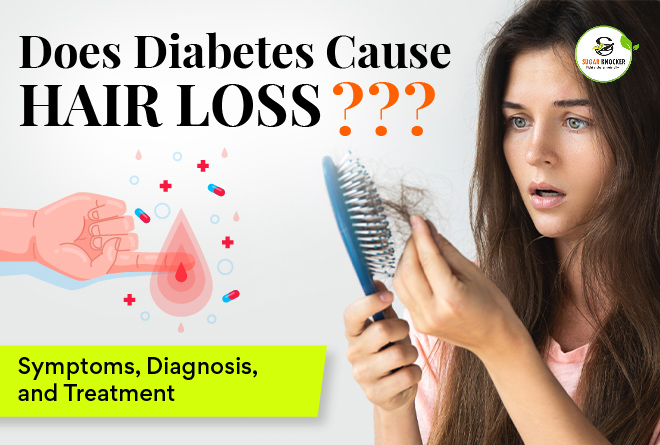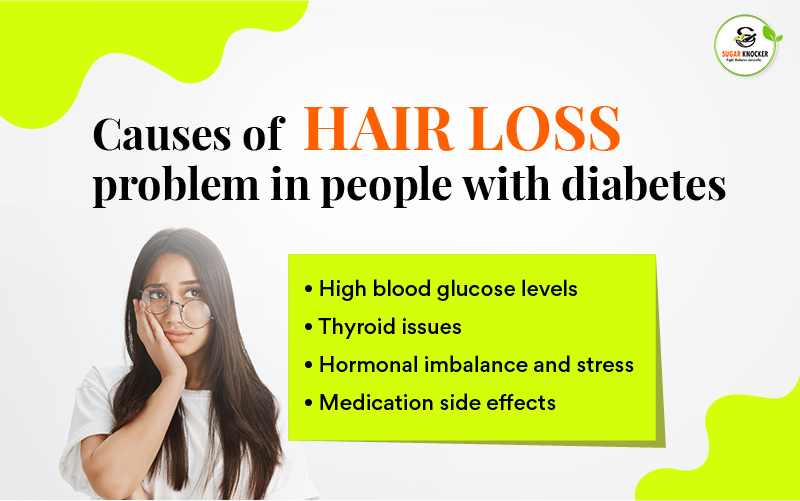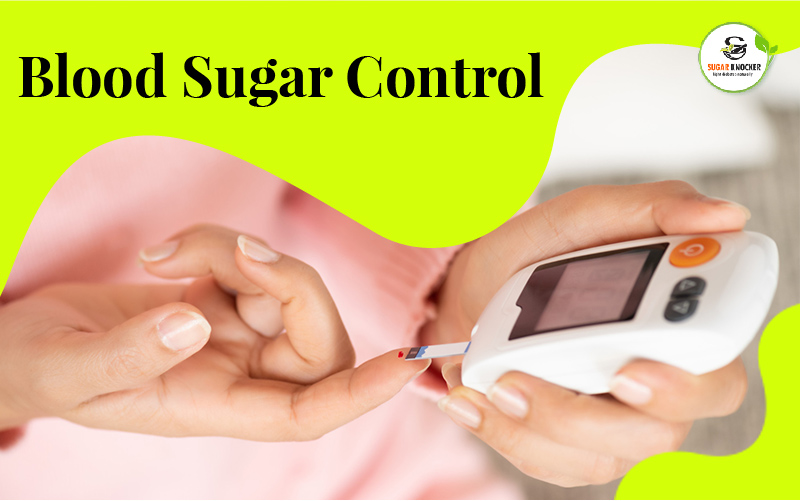
Hair loss is an unavoidable aspect of the hair growth cycle. Hair will fall out when it reaches the end of its growth cycle. To restore it, a new hair usually grows from the same hair follicle. However, new hair may not form on occasion. This hair loss can be evident if there are big head patches where new hairs do not grow.
Stress, hormones, elevated blood sugar levels, and underlying health issues like diabetes can all cause hair loss since they have an impact on hair growth.
Can Hair Loss Be a Sign of Diabetes? Can Diabetes Cause Hair Loss? How Diabetes Can Cause Hair Loss?

Hair goes through three stages on average. Hairs develop at a rate of 1 to 2 cm each month throughout the main growing phase, which lasts two years or longer. The hair then enters a resting period that lasts roughly 100 days. Some of the resting hair falls off after this phase.
Diabetes can cause hair loss since it stifles this process, causing your hair to grow more slowly. Hair loss isn’t limited to your head. Hair can fall out on your arms, thighs, and other areas of the body. When hair grows back, it grows at a slightly slower pace than usual.
Alopecia areata is a hair loss condition that is more common in people with diabetes. The immune response destroys the hair follicles in alopecia, resulting in hair loss patches on the head and other areas of the body.
Is Hair Loss A Sign / Symptom of Diabetes? Does having diabetes cause hair loss?
Hair loss is a side effect of Diabetes. Hair loss can also be a consequence of stress, such as living with a chronic illness or using diabetes medications. Thyroid disorder is common in diabetics, and it can lead to hair loss.
Unmanaged or untreated Diabetes can lead to dangerously high blood sugar levels. Blood sugar levels that are consistently high can cause harm to the body’s tissues, organs, and blood vessels.
Blood vessel impairment can reduce blood flow, resulting in cells receiving less oxygen and other nutrients than they require. This deficit can wreak havoc on the hair follicles’ regular growth cycle, resulting in hair loss.
Diabetes Symptoms Hair Loss
Diabetes can put a person’s body under a lot of physical and mental strain, and hair loss in Diabetes is common.
When sugar lingers in the blood and cannot be absorbed into the cells for energy, hyperglycemia (high blood sugar) ensues. This can be caused by a shortage of insulin, insulin sensitivity, or a mixture of the two. Damage to the microvascular and macrovascular vessels accumulates over time.
Hair follicles below the knees, for instance, can be harmed if blood vessels in the legs are broken, disrupting the supply of oxygen and nutrients and, as a consequence, affecting the hair development cycle.
This could indicate the presence of peripheral arterial disease (PAD). Intermittent claudication, slow-healing wounds, and numbness or tingling in the legs and feet are all symptoms of PAD.
All together you can consider one of the diabetes symptoms is hair loss.
Hormonal fluctuations can cause increased blood sugar, which can influence hair growth and maintenance. When cortisol (the stress hormone) concentrations are increased, cells become insulin resistant. Sugar is not removed from the bloodstream; instead, it stays in the blood.
Diabetes and Hair Loss Treatment: How to Treat Hair Loss from Diabetes

Hair loss can be reversed in some situations. There are a variety of therapies available, some of which are different for males and females. Even though diabetes and hair loss treatment are helpful, the majority of them are merely temporary fixes that function for as long as a person uses them.
Diabetes-related hair loss can be slowed or stopped in some persons. Maintaining strong blood sugar control and minimizing stress are the most effective methods to do this.
A person’s blood sugar can be controlled by:
- Frequently monitoring their blood sugar levels
- Taking all medications as directed by their doctor
- Consuming a balanced and healthy diet
- Exercising frequently
The following are some strategies that can assist a person in reducing and dealing with stress:
- enlisting the help of friends and family
- getting counseling or cognitive-behavioral therapy (CBT)
- practicing mindfulness
- Employing relaxation techniques like meditation, yoga, and deep-breathing exercises.
Diabetes and Hair Loss Treatment
Topical medicines, biotin, and lifestyle modifications are all alternatives for treating hair loss. The majority of such treatments, however, rarely produce long-term outcomes.
The initial steps
If Diabetes causes your hair loss, you will have to change your food, lifestyle, or medication to improve your blood glucose control. You should see a decrease in hair loss after your Diabetes is under control. You’ll lose lesser locks and regain more of those that have fallen out.
How Do You Prevent Hair Loss from Diabetes?
Keeping Blood Sugar in Check:

If you have Diabetes and have witnessed high blood sugars, reducing your sugar levels down to normal can help you slow down hair loss and even promote new hair growth.
Since high blood sugar is linked to vascular disruption, circulation problems, and hormonal abnormalities, keeping your blood sugars in a healthy range can help you maintain a regular hair cycle.
Your normal blood sugar range is determined by your age, the frequency with which you have hypoglycemia, and the length of time you’ve had Diabetes as well as your life expectancy
Following fasting for eight hours or more, blood sugar levels should be 80-130 mg/dL and less than 180 mg/dL two hours after a meal.
If your sugar levels are within normal range and you’re hitting your target numbers set with your health professionals, but you’re still losing hair, speak with your doctor. It’s possible that you’re losing hair due to a medical or nutritional condition.
Diet, supplements, and exercise:-

Supplementing or modifying dietary habits to include nutrient-rich meals may assist with hair loss in diabetic people and those who have nutrient deficiencies, such as vitamin D or iron insufficiency. It’s vital to understand that supplementing excessively isn’t the solution.
In fact, taking too much of some vitamins and minerals, especially if you don’t have a deficit, might be dangerous. Getting too much vitamin A and E, for example, has been related to hair loss. Because these vitamins are fat-soluble, taking too much of them can be hazardous.
It is a good idea to start with food to see whether it has any influence on your hair. If dietary changes aren’t working, you might consider getting tested for nutritional deficiencies.
Supplementing may be necessary for nutrient deficiencies; however, a specialist should always seek supplementation advice, as supplements are not monitored, and too much of some vitamins can be dangerous.
Iron, zinc, biotin, niacin, fatty acids, selenium, vitamin D, and amino acids are all essential vitamins and minerals for healthy hair.
A well-balanced diet that includes fruits, vegetables, vital fats, and a range of sources of protein may frequently encounter daily mineral and vitamin needs. In circumstances when there is a true deficiency, supplementation under the guidance of a healthcare professional may be required.
Iron
Hair loss has been linked to iron deficiency through unknown mechanisms of action. People with severe iron shortages should see a doctor about getting iron supplementation. Vegans may require dietary coaching to maximize iron absorption and consumption and avoid deficiency. Animal proteins, shellfish, legumes, nuts, peanuts, leafy greens like spinach, and whole grains are all high in iron. If you are suffering from hair loss in Diabetes, iron deficiency can also be a possibility.
Zinc
Although micronutrient deficiency is unusual, it can result in hair loss in extreme cases. Some studies have indicated that their hair loss can be reversed when persons with zinc deficiency are treated. Zinc deficiency can be caused by a variety of factors, including malabsorption problems, hereditary abnormalities, and the use of certain drugs.
Red meat, poultry, shellfish such as oysters, crabs, lobsters, whole grain, milk products, and fortified cereals are naturally abundant in zinc.
Plant-based foods do not assimilate zinc as well as animal goods. Zinc levels may need to be checked in people who eat a vegan or vegetarian diet. You should not take zinc supplements without consulting a doctor. Overdoing it on zinc might lead to a copper deficit.
Fatty Acids
‘Because, the body cannot produce essential fatty acids (omega-3 and omega-6 fatty acids), they must be consumed through the diet. A deficit might induce hair loss on the scalp and brows. It is crucial to eat enough fat because eating a diet rich in fatty acids has been linked to greater hair growth.
Selenium
Despite the lack of research, many companies provide selenium supplements for hair growth. Selenium is abundant in most diets, and deficits are uncommon. Because selenium poisoning is a possibility, eating foods high in selenium rather than supplementing is advised.
The quantity of selenium in food is determined by the soil in which it is grown. All of your selenium requirements for the day can be met with just one Brazil nut. Fish, meat, poultry, grains, legumes, and dairy are all good sources of selenium.
Vitamin D is an important nutrient.
People with alopecia areata have insufficient vitamin D levels. Vitamin D is known as the “sunshine vitamin” since it is mostly derived through sunlight.
It can be more difficult to get enough vitamin D during the cold months. Since vitamin D is only contained in a few foods, supplementation may be necessary in the case of low blood levels of inadequacy.
Salmon, trout, mackerel, tuna, fish liver oils, fortified milk and milk alternatives, egg yolks, fortified cereals, and orange juice are all high in vitamin D.
Biotin
Hair loss, fragile nails, and dry skin have been linked to a lack of biotin or a deficit. Deficiency is uncommon; however, it has been linked to enzyme deficiency, antibiotic overuse, eating too many raw egg whites, drinking, and antiepileptic medication.
Taking biotin or using biotin-containing products to help with hair loss may appear plausible. While biotin supplementation has been proven effective in treating brittle nails, there is inadequate evidence to support taking biotin for hair loss in the absence of a biotin deficiency.
You ought to be able to acquire plenty from food if you don’t have a deficiency. Spinach, oats, egg yolks, and wheat germ are all high in biotin.
Biotin Health Benefits
Protein is crucial for hair development and strength, and amino acids are the basic elements of protein. Because hair follicles are largely formed of protein, it’s understandable that a shortage of protein could lead to hair loss.
You may not be getting enough protein if you have Diabetes and have been ordered to consume a very low-calorie diet. Inadequate calorie intake can reduce vital nutrients such as vitamins, minerals, and protein. Hair loss may occur as a result of this.
It is critical to get enough protein on a regular basis. The average adult requires protein in the amount of 0.8 grams per kilogram of body weight. If you weigh 170 pounds, one kilogram is 2.2 pounds; therefore, you’ll need roughly 62 grams of protein.
Exercise

Exercise offers numerous health benefits, one of which is improved insulin sensitivity, which can help with blood sugar control which can ensure strong hair. To avoid hypoglycemia, patients with Diabetes, especially those on glucose-lowering drugs like insulin, should monitor their blood sugar frequently.
Conclusion:
It’s natural to find hair in your brush because we shed. However, if a person begins to lose an exceptional amount of hair, this should be a cause for concern. Hair loss usually has no impact on your appearance because your head has sufficient hair to compensate for the daily loss. However, hair loss caused by Diabetes is causes for concern, which is why Sugar Knocker, a brand that provides a holistic approach to eradicating Diabetes in a person’s body, is offering a free diabetic controllability test that can help you better manage blood sugar levels.


